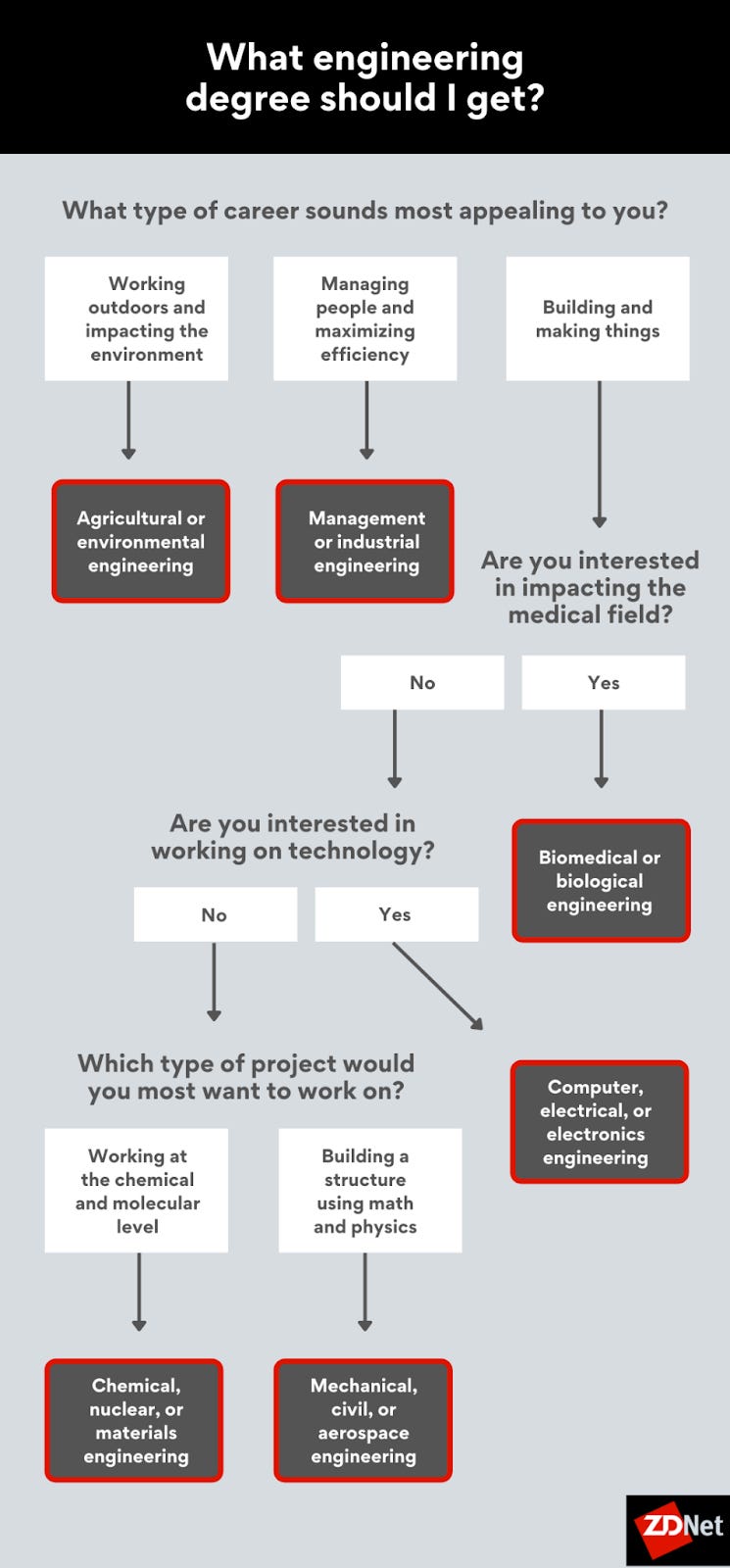To properly answer the question “What kind of engineering degree should I get?” you need to consider your strengths, interests, and career goals. It can also help to know what options you have available to you and what each engineering subdiscipline looks like.
Here, we provide details on engineering’s main branches and examine how you can decide whether the field is a good fit.
Is an engineering degree a good fit for you?
The engineering field welcomes people with all types of strengths and interests. While not exhaustive, the following list outlines the more common engineering traits and abilities.
Personality traits:
- Creative
- Analytical
- Logical
- Process-driven
- Curious
- Intuitive
Interests:
- Hands-on and technical tasks
- Fixing and modifying things
- Helping others
- Mathematics
- Science
- Improving community and society
Strengths:
- Problem-solving
- Attention to detail
- Communication
- Teamwork and collaboration
- Research and analysis
- Design, planning, and conceptualization
What engineering degree should I get?
Follow along with the chart below to help you identify which engineering degree you should aim for and which direction might serve you best.

engineering-degree-chart-final.png

What are my engineering degree options?
The engineering discipline offers many training options and majors. The field comprises four major branches: civil, mechanical, chemical, and electrical engineering. Each of these branches features subdisciplines, such as environmental, computer, materials, and manufacturing engineering.
Overlap and interaction among these fields allow students to move between them throughout their training and careers. Engineering programs feature interdisciplinary and widely applicable core training that students can use to pursue several branches.
When deciding what kind of engineering degree you should get, it may be helpful to ask yourself some questions. Consider:
- The environment you want to work in
- The type of materials you want to work with
- Whether you prefer research and theoretical explorations or practical applications.
Aerospace/aeronautical engineering
You’ll like this if: You are interested in aircraft and spacecraft and have an investigative spirit.
These engineers design, create, and test aircraft and spacecraft, plus related products and devices. Their designs must adhere to safety and environmental regulations, budgets, and quality standards. Aerospace and aeronautical engineers work with aerodynamics, guidance and navigation systems, propulsion and combustion, and robotics.
Agricultural engineering
You’ll like this if: You are interested in farming, the environment, and sustainability.
These engineers design and create agriculture products, systems, and storage facilities. They aim to improve production outputs, safety, efficiency, sustainability, and environmental outcomes. They may specialize in livestock, crops, fertilizers, waste disposal, or harvesting systems.
Biomedical or biological engineering
You’ll like this if: You are a problem-solver interested in the medical field and helping others.
In the biological engineering field, engineers design and create technological advances for the medical world. They develop medical equipment and devices, drug therapies, and models to improve our problem-solving capabilities.
Subfields in this sector include biochemical, biomechanics, bioinstrumentation, biomaterials, and rehabilitation engineering.
Chemical engineering
You’ll like this if: You are interested in chemical processes and the molecular makeup of substances.
These engineers primarily develop products, operations, and production methods for the manufacturing industry. They also often work in the petroleum industry or energy storage. Chemical engineers apply knowledge of chemicals and chemical processes acquired during their chemical engineering degree to create safe and effective manufacturing processes, facilities, and equipment.
Chemical engineering subfields include nanomaterial, biological, energy, electronics, and biotechnology engineering.
Civil engineering
You’ll like this if: You are interested in the science behind structures, along with construction, transportation, and the environment.
These engineers design, plan, and build infrastructure for the public and private sectors. They apply their knowledge of structures, building materials, and government regulations acquired from their civil engineering degree to create safe and secure buildings, roadways, bridges, and water, sewer, and drainage systems.
Subfields of this branch include construction, geotechnical, transportation, and structural engineering.
Computer engineering (hardware and/or software)
You’ll like this if: You are interested in computers and their components and want to make technological advances.
These engineers design, build, and test computer systems and components. They apply their software engineering degree or computer engineering degree training when working with hardware or software. Computer engineers may work with big data, software, hardware architecture, communications, or cybersecurity.
Electrical or electronics engineering
You’ll like this if: You are interested in and enjoy working with electrical systems, circuits, and equipment.
These engineers design and build electrical equipment and electronics. They apply knowledge of electrical power, systems, and regulations they gained from an electrical engineering degree.
Electrical engineering subfields include computer, communications, control systems, artificial intelligence, renewable energy, and signal processing engineering. This broad field also overlaps with mechanical engineering.
Engineering management
You’ll like this if: You are a leader interested in managing engineering projects, solving problems, and collaborating with other engineers.
Tasked with overseeing engineers and their projects, these professionals usually possess extensive experience or an engineering management degree. Engineering management includes research, project planning, proposals, design, and project review. Engineering managers supervise all types of engineers.
Environmental engineering
You’ll like this if: You enjoy spending time in nature and you want to help the environment.
These engineers design and develop plans, systems, and programs to solve environmental challenges. For example, they design treatment systems for drinking water, wastewater, air pollution, and solid and hazardous waste. They also inspect, monitor, and analyze existing systems and programs to identify possible improvements to protect the environment and natural resources.
Environmental engineering intersects with engineering branches including transportation, geotechnical, and structural engineering.
Industrial engineering
You’ll like this if: You are interested in managing people and processes to improve efficiency and productivity.
These engineers aim to improve production systems, methods, and processes. Their logistics and efficiency expertise also comes in handy outside industrial settings, including in hospital systems. They apply their knowledge of manufacturing and control systems acquired from their industrial engineering degrees.
Industrial engineering subdisciplines include manufacturing, safety, management, and mechanical engineering.
Materials engineering
You’ll like this if: You are interested in the properties and applications of materials.
These engineers design and process materials to create and improve products. They also test and analyze material performance. The many materials engineering subdisciplines include ceramics, plastics, composites, metallurgical, and semiconductor engineering.
Mechanical engineering
You’ll like this if: You are interested in and enjoy building and analyzing mechanical systems and devices.
These engineers design and develop mechanical devices and machinery. Equipped with a mechanical engineering degree, they solve mechanical inefficiencies and malfunctions and develop power-producing and power-using machines.
This broad field has many subdisciplines, including automotive, robotics, and heating and cooling systems engineers.
Nuclear engineering
You’ll like this if: You are interested in energy production and the applications of nuclear power.
These engineers design and build nuclear equipment, systems, and processes. They work with reactor cores, nuclear facilities, radiation, safety standards and protocols, and waste disposal. In this field, engineers may specialize in nuclear materials, radiation detection and protection, and fuel management.
Petroleum engineering
You’ll like this if: You are interested in monitoring and improving oil and gas collection, storage, and usage.
These engineers design and build equipment and processes for oil and gas extraction and production. They work with oil and gas fields, drilling equipment and strategies, reservoirs, and storage facilities. Petroleum engineering subdisciplines include reservoir, production, completions, and drilling engineering.
This article was reviewed by Sierra Gawlowski, PE

Sierra Gawlowski, PE, earned her BS in civil engineering and is a licensed professional engineer in the state of Washington. She has worked for a private engineering consulting firm as well as for public agencies. Sierra enjoys mentoring engineering students and junior staff. She also leads a project team for Engineers Without Borders and currently sits on the board of directors for Kilowatts for Humanity.
Gawlowski is a paid member of the Red Ventures Education freelance review network.





































